'Dope' Director Rick Famuyiwa Talks Music, Filmmaking, Inspirations And Impact
You can't make a movie like Dope without a ton of passion. Every frame, every character, every decision comes from a love not just of cinema, but for pop culture as a whole. The film's writer and director Rick Famuyiwa is a massive film fan and geek who cites Spielberg, Lucas, and calls Back to the Future his favorite movie of all time.
However, looking as Famuyiwa's resume, odds are you didn't know any of that. Before making Dope, he directed The Wood, Brown Sugar and Our Family Wedding. Three financially successful films, yes, but none of which are known for Dope's sense of youthful exuberance. It feels like, after that formidable foray into filmmaking, Famuyiwa is finally hitting his stride. Dope is a confident film, a fun film, and a great film to discuss.
Which is exactly what we did. We spoke with Famyuiwa on the occasion of Dope, which opens Friday June 19, and talked about the film's complex tone. Its use of pop culture references, issues with music, how it changed from its Sundance premiere to now, as well as the meaning of "geek" in the film. We broke down two of the best sequences in the movie and found out whether or not the director has been approached to make any major studio blockbusters. Below, read our Rick Famuyiwa Dope interview.
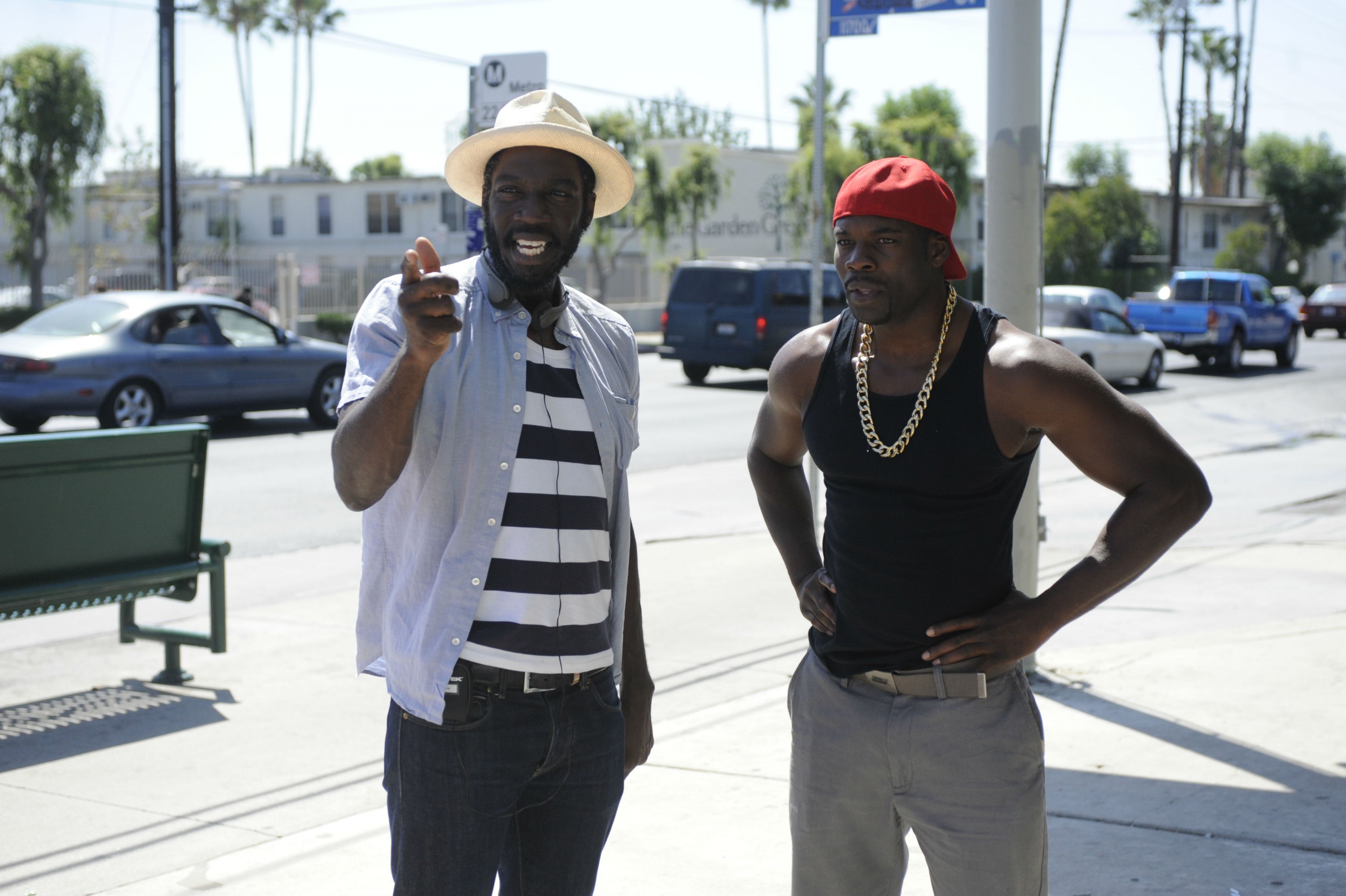 Tonal control in movies is always very difficult. And this movie is all over the place on purpose; it's totally undefinable. Where do you find the tone? Is it the script, is it the edit? Is it on set?
Tonal control in movies is always very difficult. And this movie is all over the place on purpose; it's totally undefinable. Where do you find the tone? Is it the script, is it the edit? Is it on set?
It started with the script. I worked on it a lot just to get that balance 'cause I wanted to put a lot into it. I knew there were gonna be a lot of different genres, styles and tones I was trying to mix. And so I spent a lot of time just really focusing that in the script and getting into a place where I felt like "Okay, this has the nice balance of structural expectation with surprises that you can kind of justify." But that also gets completely modulated once you're on set and you're working with the actors and then clearly in the edit, is where you really find it. When you sort of combine the music with the acting with everything else. That's always my favorite part of the process, post and the editing process. And so that's really where you find it and kind of fine tune it. But it was consciously there from the beginning in the script.
I'm a huge fan of movies with pop culture references. This is a movie that is being sold partially on that concept, but doesn't go overboard with it. What are some of the tropes that you have to avoid and things that you sort of looked at to emulate when you have a movie that's so encompassed in pop culture?
Well I tried to keep it in line with how people naturally speak. When I watch films and it becomes just about the reference and not necessarily a flow with how people naturally speak, that's when you're just saying, "Okay, I'm trying to be cool and show off." But I just wanted to be like "Here's the way when I talk to my friends and we all get around." That's how we speak and we're talking about shit we've seen and stuff we listen to. And we quote stuff and we throw it in there. And it comes out in appropriate and inappropriate times. And so I just wanted it to feel like here are these kids in this situation and they're thrown into something and they're just reacting and talking the way they would normally. But it's just, now, things are heightened. And so as long as it connects to the rhythms of how people naturally talk, then it works. But I don't know if I have a complete feel.
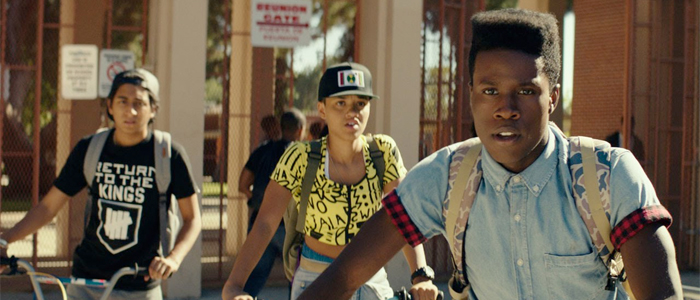 Part of that is the soundtrack. Doing a movie with a '90s songs, were there tunes you couldn't afford?
Part of that is the soundtrack. Doing a movie with a '90s songs, were there tunes you couldn't afford?
Well that was the difference between the cut you saw at Sundance and the cut we have now was we had more money to get music.
So there are more songs–
There are more songs now. When we got into Sundance, there was always sort of an original list in my head that I wanted. By Sundance there were just a ton we couldn't afford. And then some that we just couldn't clear. We wanted to get Biggie's Things Done Changed for the big bus chase sequence when they're getting chased on their bikes. And could never get it cleared, because like 20 percent of the publishing is in dispute. But once Open Road came on we were able to get a lot of the music that I really originally intended to get in there. So I was happy with where we ended up. Even though we didn't get everything.
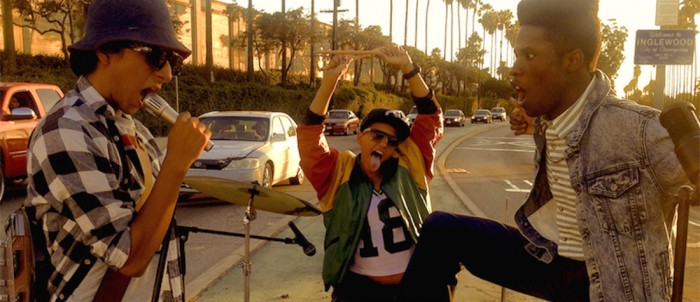 What are some of the other differences between now and Sundance? Did you cut anything or was the cut exactly the same and just added music?
What are some of the other differences between now and Sundance? Did you cut anything or was the cut exactly the same and just added music?
We cut probably a minute out of the movie. Sundance was the first public screening of the movie anywhere, besides like me, the editor and a few of our friends. So we didn't have a usual testing process. So I thought that what we put at Sundance was pretty close, but there were areas where [I was like] "Okay, we can tweak here. There's some pacing issues here that I wanna deal with." So I was able to go in and really tighten up a couple of areas like the Molly montage sequence. That, I felt, was a little loose in Sundance, so I just wanted to make a little tighter. But nothing significantly changed from that Sundance cut.
When I think of the geek stereotype I think of a Poindexter thing with glasses. In this movie, Malcolm and his friends own the geek thing and it's not really geeky. They're just sort of just super passionate. Is that your definition of "geek?"
Yeah. I feel like geek is about obsession. I feel like I geek out on certain things and that just means it's a mad devotion or obsession to something. And whether that is '90s Hip Hop gear or technology it's just you're going beyond the normal, you know what I'm saying? Also for me I felt like, "geek" was just a term that means different. So these kids, in their own minds, feel their own sense of identity and cool. It's just sort of in relation to everybody else. And in a different environment maybe they're the cool kids. But in this environment they're considered geeks just 'cause they don't fit into the normal tropes of who they should be.
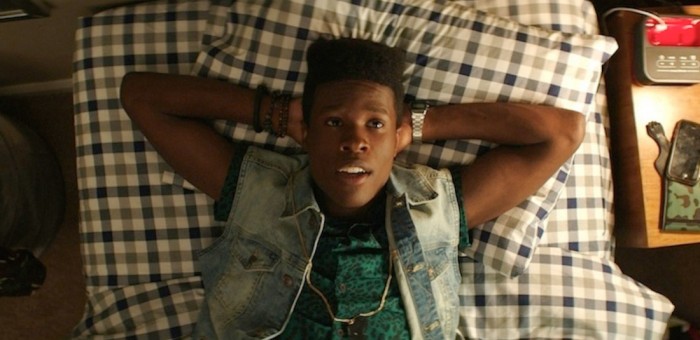 So was there a line to that geekiness? Because you see movie posters and he has a Superfly VHS and Super Nintendo. But that's just all on the periphery. It's all production design. Did you consciously keep video games and movies out of the narrative in favor of music?
So was there a line to that geekiness? Because you see movie posters and he has a Superfly VHS and Super Nintendo. But that's just all on the periphery. It's all production design. Did you consciously keep video games and movies out of the narrative in favor of music?
Well yeah. I mean, I wanted it to be there and and I think it's a lot of the stuff that I was fascinated with. Like the Nintendo Game Boy and everything that I came up with and my friends played with. So yeah, I wanted to have that feel and these kids to kind of be partly digital, but also partly analog in their life. And so I felt like there was that nice mesh that they would bring together because they were obsessed with the '90s. They could kind of bleed into their lives, but they're still very much immersed in the technology of their generation.
One of my favorite songs of all time is Scenario by A Tribe Called Quest and you use it to great effect where visuals and actions are lining up with the lyrics. It's so great. But that scene also seems completely different from everything else in the movie. Can you talk about the development of that scene. Which came first, the song or the scene?
Well the song came second. I mean, originally had in my mind a Pharcyde song called Drop. And I was always obsessed with that video shot by Spike Jonze where they shoot it forward, but they did everything backwards.
Yeah, right, I've seen that.
So the idea when I was writing the script was that you would see these characters converge in different points in different timelines and then go back, kind of in the spirit of that video. So that kind of evolved with budget constraints. It was one of those things you have to figure out you really are gonna do when you understand you can't afford to do the big shoot-it-forward-and-do-it-backwards sequence. So then after that I had another song. It was Beastie Boys' Sabotage. But they never clear music. So it ended up Scenario 'cause that was a song that was playing in the second half of the scene. We just kind of extended it to the first half. And then that one of [the shots] just lined up perfectly by chance with one of the lines. The "powerful impact." But we were like "Whoa, that's kind of cool."
So we went and found some other spots like that. But that's kind of the organic process of how it started originally in my head to production constraints to finding a song that you were like "Okay, this is really cool."
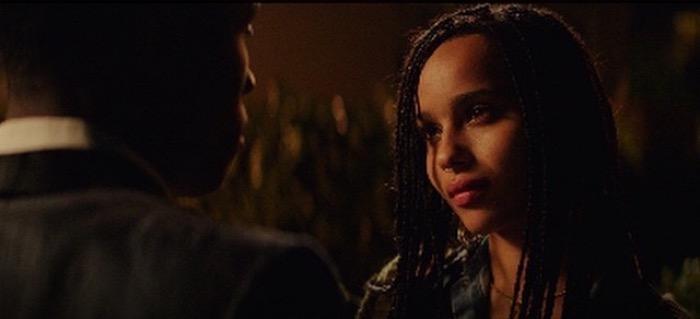 I think that's my second favorite scene, after the Lily Montage where you cut and then relive the entire party on social media. How did you come up with that idea?
I think that's my second favorite scene, after the Lily Montage where you cut and then relive the entire party on social media. How did you come up with that idea?
Yeah, it was just based in how we all communicate. So much of the information we get and share is not one to one. It's like that scene 50 years ago would have been the phone calls and they're all on the phone and then there's split screens. It's kind of like that was that generation's Bye Bye Birdie, right? Where they're all on the phone. That probably seemed like "Wow, the kids are all on phones." So my idea was this is how this generation communicates and how would they share this information and what is that idea of going viral and what does that mean in real time? So it just sort of made sense with how I was telling the rest of the story.
You've already done a lot of studio films, films many people have seen. Now, when a director has a hit Sundance movie, they immediately go to the $250 million blockbuster.
I know, yeah.
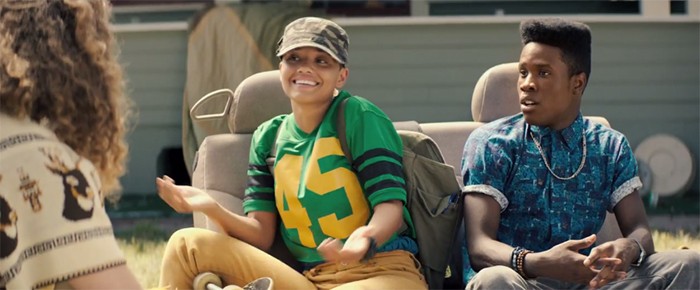 Is that something that you've been approached about, or would be interested in?
Is that something that you've been approached about, or would be interested in?
Yes. I mean, there's been a couple of things that have come my way that would be really interesting to do. So I'm kind of weighing and figuring it out. But yeah, I mean, look. I grew up on Spielberg and Lucas. That was sort of what inspired me to make movies. And so Back to the Future is like my one of my favorite films of all times and it's why [the character] Dom calls Malcolm "McFly." And so doing that, taking sort of what I think I do well and then sort of putting it on that stage, I think is something that I'd really be interested in doing.
Dope opens June 19. Read our review from Sundance here.
